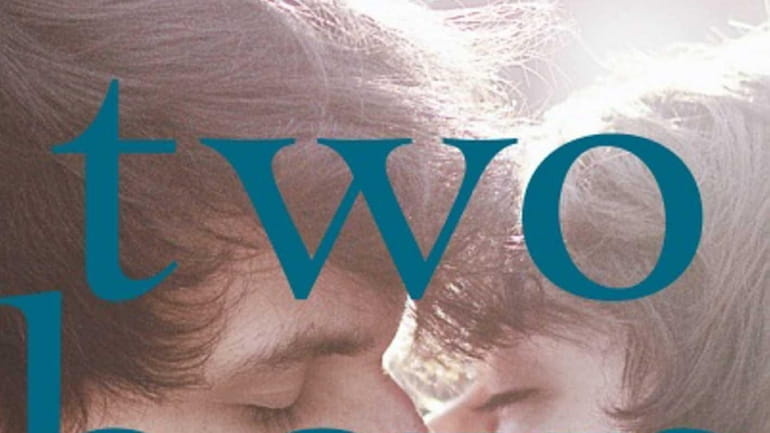Bookshelf: 5 new YA novels

"Two Boys Kissing" by David Levithan (Knopf, August 2013) Credit: Handout
We stand on the shoulders of those who came before us, goes an oft-paraphrased line. David Levithan gives vivid voice to it in his latest YA novel, "Two Boys Kissing" (Knopf Books for Young Readers, $16.99, ages 12 and older). The story is narrated by a Greek chorus of ghosts who look on at the lives of gay teens today and pick out a few to recount: Harry and Craig, although no longer a couple, are gearing up to set a Guinness World Record for longest kiss; Ryan and Avery are about to experience the rapture and complications of first love.
"We are your shadow uncles," this chorus says, "your mother's or your grandmother's best friend from college, the author of that book you found in the gay section of the library . . . or names on a quilt." We see that some boys enjoy a freedom the ghosts dreamed of and fought for; it was only after Stonewall and gay pride marches that a school would organize the gay prom at which Ryan and Avery meet. Some boys, on the other hand, still feel shame or experience violence that the ghosts recognize only too well.
Francesca Lia Block also nods to Greek storytelling in her post-apocalyptic novel, "Love in the Time of Global Warming" (Christina Ottaviano Books/Henry Holt, $16.99, ages 14 and older). A massive earthquake that has reduced Los Angeles to rubble is called "The Earth Shaker" -- a common epithet for Poseidon -- and a motley group of survivors proceeds on a road trip to the accompaniment of readings from Homer's Odyssey. Block's characteristic blend of magical touches and gritty realism lends itself well to a tale with mythic overtones. She plays with archetypes -- warrior princess, consort, soothsayer -- in a story that reflects equally on finding one's way home after a rough night, a rough youth or a rough global catastrophe.
Long Island author Henry Clark's fresh sense of the absurd makes "What We Found in the Sofa and How It Saved the World" (Little, Brown Books for Young Readers, $17, ages 8-12) a hilarious tale of attempted world domination and mind control through cellphones and junk food. The adventure begins when three middle-schoolers find a discarded sofa at their bus stop. The couch, part of a living room set equipped with artificial intelligence, recruits them for a mission to rescue the world. When the kids meet their first alien, they can't decide if he's dangerous: "You deliberately say off-the-wall things, and wear only one sock, and dress like you don't know what century it is, because you're trying to come across like Willy Wonka ... because you figure ... this will somehow charm us and make you our friend!" To which the alien says, "Did I overdo it?" Yes, Clark overdoes it, and it's all good.
After a mid-series slump, Gennifer Choldenko is back with "Al Capone Does My Homework" (Dial Books for Young Readers, $17.99, ages 10 and older), the third (and, sadly, last) of her books set on Alcatraz Island in the 1930s. Moose Flanagan's father has risen to the position of associate prison warden, so, in the island hierarchy, 13-year-old Moose is no longer quite so subordinate to the warden's teenage daughter (and mini femme fatale), Piper. Natalie, Moose's difficult older sister with the unnamed condition that readers recognize as autism, is growing up. The hardened prisoners are still on the constant lookout for a break, and lurking behind the scenes is the shadowy figure of Alcatraz's most famous inmate, Al Capone. Choldenko's storytelling is compelling, portraying human decency as a force more powerful than heroism.
The literary confection "Keeping the Castle" by Patrice Kindl (Speak/Puffin Books, $16.99, ages 12 and older) might be termed "Jane Austen Lite." Our heroine, Althea, has no illusions about her responsibilities: It's up to her to marry well, or Crooked Castle, the decaying pile of rocks that is her family home, may fall to wrack and ruin for want of funds. Kindl wittily illuminates the threadbare state of Crooked Castle as well as the social rules of Regency England when Lady Throstletwist stands up from her rickety chair to take leave after tea: "Her chair shuddered and then slowly collapsed into a sad little splintered heap on the floor. Being extremely well bred, she sailed on out through the door without a backwards glance at this small disaster."
